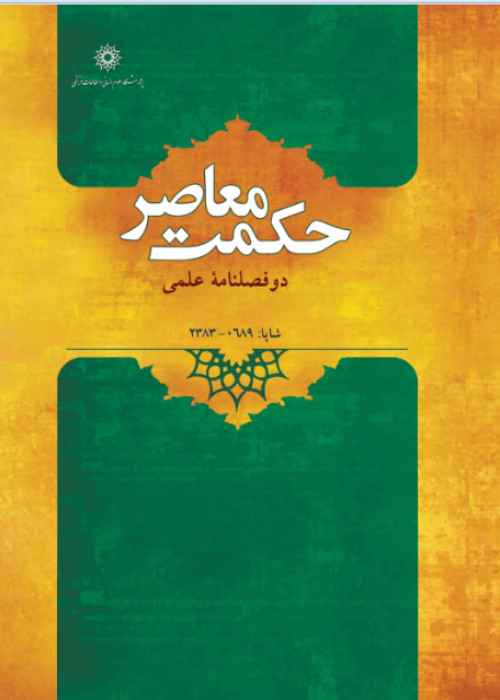Thematic development of philosophy by Allameh Tabatabai in comparison with Ibn Sina and Mulla Sadra; And its function in other sciences
Examining the subject of philosophy shows that philosophers have had different views of the scope of the subject. In this article, we seek to answer the question whether Allama Tabataba’i widened the scope of philosophy in comparison to his two great predecessors. If the answer is positive, what impact does the difference in scope have on the function of philosophy in sciences? To answer fundamental questions and therefore to advance and progress, various sciences - including natural and human sciences and even mathematics - require general principles and rational and ontological presumptions relevant to individual particulars, provision of which falls on philosophy. The question is whether the subject of philosophy in Allama Tabataba’i’s view has the required scope to propose these principles and presumptions. There are some researches about the subject of philosophy in his view, but they have not examined whether it includes mathematical and natural limited existents (wujūdat-i muqayyad). To answer the above formulated questions, first the subject of philosophy for Allama is reread and his different stated views on the topic are analyzed. Then, the domain of the subject of philosophy in Allama Tabataba’i’s, Avicenna’s, and Mulla Sadra’s views are compared and analyzed. Having assessed the relation between the three philosophers’ views of the subject of philosophy, some of the functions of philosophy in sciences are explained in brief. Finally, the impact of widening the scope of philosophy on formation of new philosophical branches and development of philosophy’s function is examined.
This research has been conducted through the analytic-descriptive method with an emphasis on the subject of philosophy in the works of three Islamic philosophers, namely Avicenna, Mulla Sadra, and Allama Tabataba’i. The data have been collected, extracted and then compared with the library research method. Finally, through analysis of the data it is examined to what extent the scope of the subject of philosophy in Allama Tabatabai’s view functions in and is effective on sciences.
Being as being, or absolute being, is the title that all the three philosophers have chosen for the subject of philosophy, but the term has different meanings and examples in their works. In initial stages, Mulla Sadra chose the universal concept of existence - which is among the secondary intelligibles (ma’qūlat-i sanaviyyi) – as the meaning of being, but in next stages he regards existent in its factual sense as an example of existence. As such, the unified graded existence flowing through all existents in contrast to limited existents is the subject of philosophy. The question is whether the most specific types of existents can be the subject of a philosophical discussion. Through pursuing this question the following results were obtained: No matter whether the universal concept of existence or unified graded factual existence constitutes the subject of philosophy, the types of the universal concept of existence or limited existents that are at some level of the graded unified factual existence can be deemed a subject of philosophy. However, in Avicenna’s and Mulla Sadra’s views, it is required that the types in question should not be peculiar to mathematics and natural sciences, or, to put it more precisely, should not be peculiar to the subjects of the sciences of the individual. In philosophy, only those types of existence are discussed which are the attribute of existent things without mathematical and natural limitations.Allama Tabataba’i too believes that existence as absolute and universal is the subject of philosophy, but also that the most specific types of existents can unconditionally be the subject of philosophical discussions.In addition to the term being as being, Allama Tabataba’i also uses the term reality, and from his explanations it becomes clear that individual realities are not only part of discussions of categorization in philosophy, but can be the subject of a more universal philosophical knowledge than divine philosophy.To enhance the functioning of philosophy in sciences, it is essential that the domain of philosophy be delimited in a way that it incorporates such specific phenomena related to other sciences as justice, freedom, beauty, life, individual and social behaviors, etc. (i.e. phenomena whose ontological analysis provides presumptions and principles that sciences need). It seems that Allama’ Tabataba’i’s expansion of the scope of philosophy makes this possible through forming new philosophical branches pivoting on ontological analysis of all phenomena.
If the subject of philosophy is confined to universal existence and its primary categories, it won’t be able to respond to an important part of ontological questions of natural and mathematical sciences dealing with individual beings. This causes both stagnation of philosophical knowledge and impedes development and growth of sciences. It seems that through expanding the scope of philosophy Allama Tabataba’i provided the capacity required for the formation of new philosophical branches - the types of knowledge that based on the universal philosophy and its demonstrated principles both develop the function of philosophy and lay the ground for validation of other sciences.
- حق عضویت دریافتی صرف حمایت از نشریات عضو و نگهداری، تکمیل و توسعه مگیران میشود.
- پرداخت حق اشتراک و دانلود مقالات اجازه بازنشر آن در سایر رسانههای چاپی و دیجیتال را به کاربر نمیدهد.



